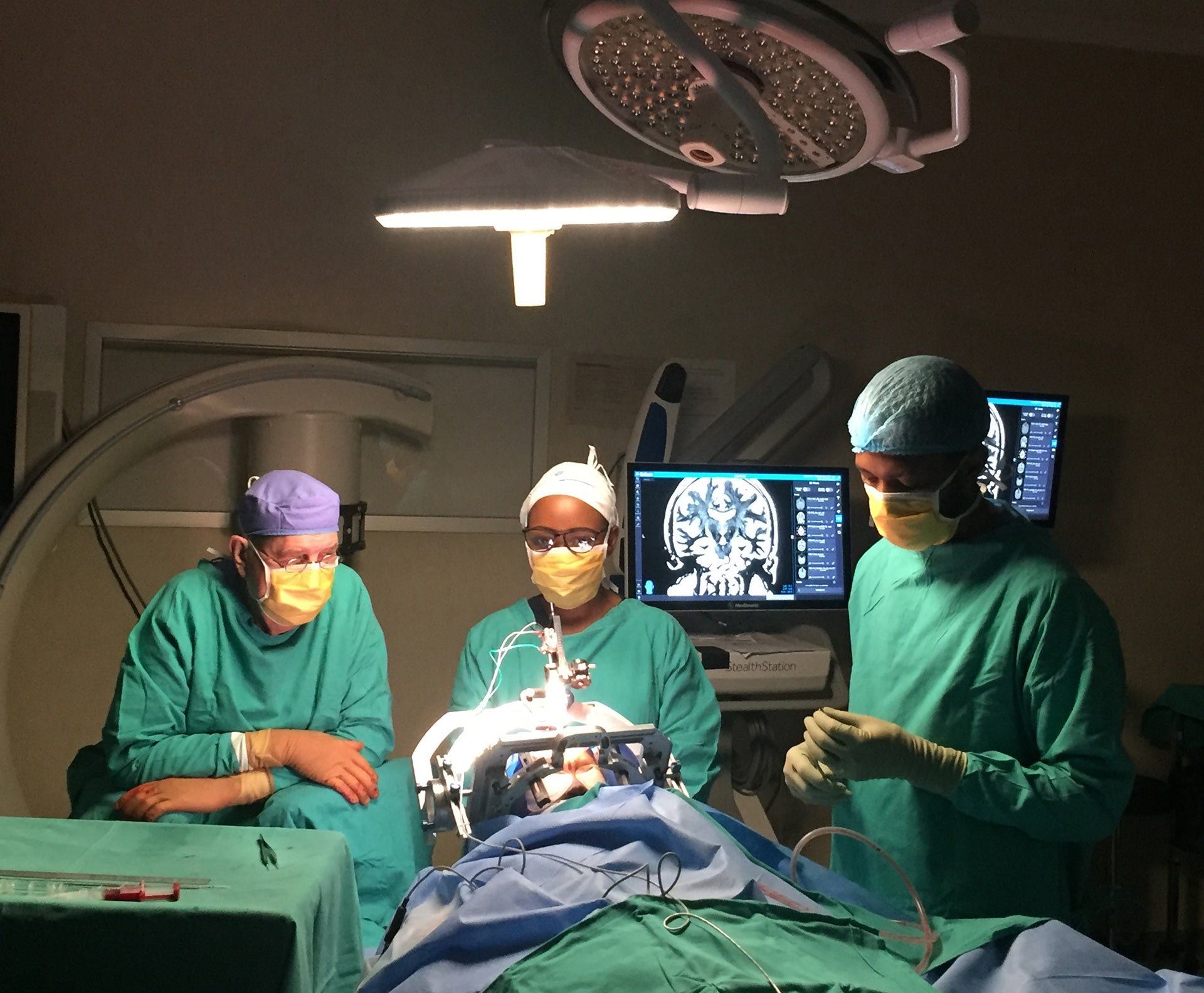Eminent neurosurgeon in private sector collaborates with public sector counterpart to build super speciality surgical skills
Drickus Maartens • December 11, 2019
Above: Neurosurgeon, Dr Pieter Slabbert (left) from Netcare Pretoria East Hospital, is pictured with Dr Nomusa Shezi (centre), a neurosurgeon at Inkosi Albert Luthuli Central Hospital (IALCH), and IALCH registrar, Dr Mduduzi Msomi (right) during a public-private training initiative for deep brain stimulation (DBS) procedures at the Durban public hospital. The training was made possible by Netcare and medical technology company Medtronic. Dr Slabbert is one of the most experienced neurosurgeons in the complicated techniques involved in DBS procedures, used for the treatment of various movement disorders including Parkinson’s disease.
Eminent neurosurgeon in private sector collaborates with public sector counterpart to build super speciality surgical skills
Collaboration between the private and public health sectors recently created an opportunity for the sharing of super specialised medical expertise, when eminent neurosurgeon, Dr Pieter Slabbert who practises at Netcare Pretoria East Hospital, and his counterpart neurosurgeon, Dr Nomusa Shezi from Inkosi Albert Luthuli Central Hospital, performed two highly complex brain surgery procedures at the public sector hospital in Durban.
“Dr Slabbert is one of the most experienced neurosurgeons in the complicated techniques involved in deep brain stimulation [DBS] procedures, used for the treatment of various movement disorders. He has frequently assisted visiting neurosurgeons from around the world to hone their skills required for this super specialised procedure,” says Dr Erich Bock, Netcare’s North East regional director.
Dr Shezi, who achieved a remarkable feat by becoming KZN’s first black female African neurosurgeon in 2017 and is in the process of developing a Functional Neurosurgery unit in her Department, previously visited Netcare Pretoria East Hospital in order to observe Dr Slabbert perform the DBS procedure. The 34-year-old neurosurgeon then asked Dr Slabbert, who is one of only a handful of neurosurgeons in South Africa versed in this super speciality, to mentor her in the technique, which will ultimately benefit many public sector patients suffering from nervous system disorders that severely affect their movement, such as dystonia and Parkinson’s disease.
“Parkinson’s disease is not a terminal illness, however over time this progressive condition erodes the individual’s quality of life to the point where they often lose their independence. Eventually, people with Parkinson’s may lose the ability to drive, dress themselves and may have difficulty completing other daily tasks because the condition causes tremors and slows movement,” Dr Slabbert explains.
The DBS procedure involves implanting electrodes deep in the brain, which are connected with thin leads to a neurostimulator device implanted in the patient’s chest. Once the device is turned on, the stimulation effect can dramatically reduce symptoms, resulting in the person’s quality of life being greatly restored.
“In conjunction with medication, DBS has shown excellent results with improvements of up to 90% in the management of symptoms associated with movement disorders,” notes Dr Slabbert, who has performed over 400 such procedures.
In a public-private training initiative, made possible by Netcare and medical technology company Medtronic, the manufacturer of the DBS device, Dr Slabbert and his experienced team including specialised nursing professionals from Netcare Pretoria East Hospital travelled to Inkosi Albert Luthuli Central Hospital in order to perform onsite training while two DBS procedures were performed by the neurosurgeons.
“The opportunity to learn from such an experienced neurosurgeon as Dr Slabbert, who is internationally respected in this highly specialised field, and his team has been an enriching experience. We have not only gained expertise from this exercise, but also developed the skill to perform this intricate brain surgery. We are grateful to Dr Slabbert and his team, as well as to Netcare and Medtronic for making this collaboration possible,” Dr Shezi says.
Dr Shezi is currently developing Functional neurosurgery expertise within the public sector and, working with her team including specialist neurologist, Dr Ferzana Amod, is establishing a movement disorder unit at Inkosi Albert Luthuli Central Hospital to assist more public sector patients with movement disorders such as Parkinson’s disease.
“To see the difference DBS has made in the lives of patients and their families is truly rewarding. We will be applying the skills learned to benefit more of our patients in KwaZulu-Natal and further afield in the future, and this will also allow us the opportunity to add to the scientific body through research,” Dr Shezi adds.
Dr Slabbert urges other specialists in the private sector to partner with their counterparts in the public sector to help build expertise and capacity in their respective fields. “As a medical community we need to invest time in our colleagues, so that we are all empowered with the necessary expertise to deliver world-class treatments to more patients,” he concluded.













